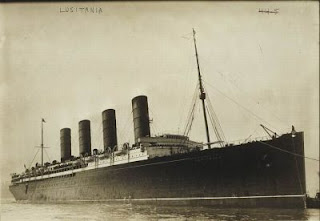In The Evidence in the Case, which was first published in the autumn of 1914 and revised in 1915, Beck took a legal approach to try to determine the cause of the world war that started in August 1914. The War and Humanity is a collection of writings in which Beck firmly asserted his support in the war for the Allied Powers (France, England, and Russia) against the Central Powers (Germany and Austria).
The War and Humanity also became part of the debate over the involvement of the United States in the war. This debate was so strong that Beck delayed the publication of The War and Humanity until after the United State presidential election of 1916, to avoid the appearance of trying to influence that election.
Beck was strongly critical of U.S. President Woodrow Wilson, who was re-elected in 1916. In the introduction of the book, he wrote:
The spirit of America is neither dead nor sleeping. But under our form of Government the people are powerless to move in their foreign relations, unless the Executive leads. That they lacked a true leader in this greatest moral crisis of civilization, was their infinite misfortune.Beck talked about the responsibilities of the United States towards civilization. The extensive damage of the war made it less reasonable for the United States to stay neutral. Beck also tried to point out the difference between "entangling alliances" that might involve an involuntary commitment, and crisis-specific alliances that had a clear and justifiable purpose.
In a speech in England in the summer of 1916, Beck emphasized America's support for England, France, and Russia in the war. He focused on the common traditions and interests of America and England. He also tried to show how difficult it was for both the government and the people of the United States to let go of the official policy of neutrality and support the allies. Overall the book shows how the foreign policy of the United States evolved from primarily isolation to more involvement in the world.
America's reaction to the war in Europe hurt its world reputation, Beck asserted. These negative feelings came from many directions, in spite of America's attempt to publicly show a policy of neutrality. Every country seemed to feel that America was doing too much of one thing or not enough of another thing.
Beck's train of thought on this subject led him to analyze America's military preparedness, which he felt was inadequate because of the "introspective " nature of American society. Beck went into much detail about the inadequacy of the defenses of the United States, in a similar manner to what was described in The Writing on the Wall: The Nation on Trial (1916), by Eric Fisher Wood.
Beck felt that statements about United States neutrality by the first President of the United States, George Washington, had been misinterpreted by contemporary observers. Neutrality was more important in the late 1700's to help the United States become more unified, build up its wealth, and avoid favoritism in world affairs. In the early 20th century, the world was more complicated and interconnected, and it was not in the best interests of the United States to remain politically isolated.
The War and Humanity includes discussions of two famous events of the war—the sinking of the Lusitania and the execution of Edith Cavell.
 |
| Lusitania |
The sinking of the Lusitania in May 1915 set off a series of diplomatic debates between the United States and Germany that revolved around the interpretation of words and phrases like "noncombatant," "war zone," and "liner." There were months of negotiation over the "submarine controversy" with the important issue of how to handle armed merchant men. Beck used these discussions to back up strong criticism of United States President Woodrow Wilson.
Beck applied his legal experience to a lengthy analysis of the case of Edith Cavell, an English nurse who was executed after helping English, French, and Belgian soldier escape to neutral Holland. Beck asserted that Cavell was unfairly executed because the law under which she was charged was interpreted wrongly. Also, the details of her arrest, confinement, trial, and execution were severely limited by the German authorities.
The chapter on Cavell also gave insight into how German authority was exercised in occupied Belgium. Both civil and military governments existed, and sometimes there was confusion about whose authority had to be followed.
The United States attempted to intervene in the case of Edith Cavell. This attempt showed how America had to walk a fine line between appearing neutral and honoring its informal alliance with England.
Beck had mixed feelings about how the defeated countries of the war should be treated. He felt that the forgiveness that was shown in the Revolutionary War and the Civil War towards the vanquished opposition helped heal relations. But he also understood how aggressive and destructive actions during the war could not be completely ignored during postwar negotiations.
The War and Humanity was published around November 18, 1916, when it was advertised in The New York Times. Front page headlines in that day's Times included:
- GERMANY TO DEPORT 300,000 BELGIANS; NATION IS WILD WITH GRIEF AND TERROR; ALLIES PLAN STRONG COUNTERSTROKE / BELGIAN VICTIMS DEFIANT / Sing Patriotic Songs As Packed in Cattle Trucks They Go To Exile.
- Norwegian Mail Ship Is Sunk by U-Boat But the Passengers and Crew Are Saved
- ENTENTE LEADERS CONFER IN PARIS / Purpose to Take Vigorous Measures to Offset Teuton Mobilizing of Belgians and Poles. / WILL BE PARTLY ECONOMIC
Online versions:
Newspaper information from Newspapers.com (https://www.newspapers.com/)
Lusitania photograph courtesy of the Great War Primary Document Archive: Photos of the Great War - www.gwpda.org/photos
No comments:
Post a Comment